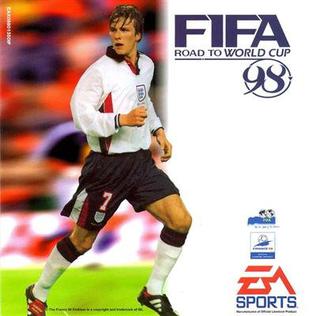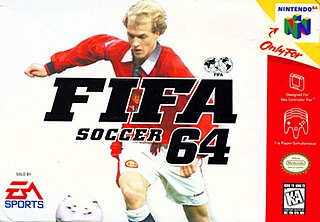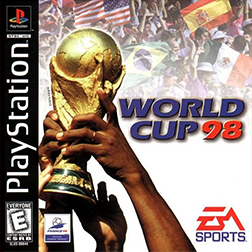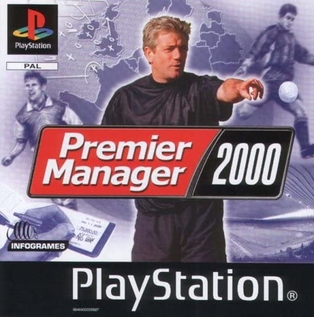A sports video game is a video game that simulates the practice of sports. Most sports have been recreated with video games, including team sports, track and field, extreme sports, and combat sports. Some games emphasize playing the sport, whilst others emphasize strategy and sport management. Some, such as Need for Speed, Arch Rivals and Punch-Out!!, satirize the sport for comic effect. This genre has been popular throughout the history of video games and is competitive, just like real-world sports. A number of game series feature the names and characteristics of real teams and players, and are updated annually to reflect real-world changes. The sports genre is one of the oldest genres in gaming history.

FIFA is a discontinued football video game franchise developed by EA Vancouver and EA Romania and published by EA Sports. As of 2011, the FIFA franchise has been localized into 18 languages and available in 51 countries. Listed in Guinness World Records as the best-selling sports video game franchise in the world, the FIFA series has sold over 325 million copies as of 2021. On 10 May 2022, it was announced that EA and FIFA's partnership of 30 years would come to an end upon the termination of their licensing agreement, making FIFA 23 the last entry to the franchise under the FIFA name. As a successor to the FIFA series, EA launched the EA Sports FC franchise, with EA Sports FC 24 being the first installment under the new name.

Sensible Soccer, often called Sensi, is an association football video game series which was popular in the early 1990s and which still retains a following. It was developed by Sensible Software and first released for Amiga and Atari ST computers in 1992 as well as for the IBM PC compatibles. The series was created by Jon Hare and Chris Yates, as a successor to their previous football game MicroProse Soccer (1988), which in turn was inspired by the arcade video game Tehkan World Cup (1985).
The UEFA Champions League video game license has been used by five different companies. Debuting in 1996, the series has only had five games published so far, and after being in the hands of Krisalis Software, Silicon Dreams Studio and Konami, the license now lies in the hands of EA and Sega.

FIFA International Soccer is a 1993 association football video game developed by EA Canada's Extended Play Productions team and published by Electronic Arts. The game was released for the Sega Mega Drive/Genesis console in December 1993 and ported to numerous other systems in 1994. It is the first game in the FIFA series.

FIFA 97 is a football simulation video game developed by EA Canada and published by Electronic Arts. It was released for PC on 24 June 1996 and versions for PlayStation, SNES, Mega Drive and Sega Saturn followed.

FIFA: Road to World Cup 98 is a football video game developed by EA Canada and released by Electronic Arts in 1997. It is the fifth game in the FIFA series and the second to be in 3D on the fifth generation of video game consoles. A number of different players were featured on the cover, including David Beckham in the UK, Roy Lassiter in the United States, Mexico and Brazil, David Ginola in France, Raúl in Spain and Portugal, Paolo Maldini in Italy, and Andreas Möller in Germany. FIFA 98 was the last FIFA game released for the Sega Genesis, Sega Saturn and the Super Nintendo Entertainment System (SNES).

FIFA Soccer 64, known in Europe as FIFA 64 and in Japan as J. League Live 64, is an association football video game developed by EA Canada and published by Electronic Arts for the Nintendo 64. The cover features Manchester United midfielder Jordi Cruyff. The game garnered mixed reviews from critics upon release. Although its simulation was generally praised as realistic, reviewers critiqued the jerky animation, choppy frame-rates, unresponsive controls, and underwhelming usage of the Nintendo 64's capabilities. The Japanese version has officially licensed players and teams from Japan's J. League.

International Superstar Soccer 64 is a video game developed by Konami Computer Entertainment Osaka in the International Superstar Soccer series by Konami. Its team lineup follows the Super NES version of International Superstar Soccer Deluxe, only with South Africa replacing Morocco.

International Superstar Soccer Pro is a football video game developed by Konami Computer Entertainment Tokyo. It is a slightly improved version of the Japan-exclusive J-League Jikkyō Winning Eleven 97.

ISS Pro Evolution 2 is the fourth video game in the ISS Pro series and the second installment of the ISS Pro Evolution series, developed exclusively for the PlayStation by Konami Computer Entertainment Tokyo, a division of Konami it was available in Europe and Japan but not available in North America due to the previously released enhanced remake version of the previous entry in the series, ISS Pro Evolution, retitled ESPN MLS GameNight with MLS licenses.

World Cup 98 is a football video game released in 1998 to coincide with that year's FIFA World Cup football tournament, developed by EA Canada and published by Electronic Arts under their EA Sports label. It is the first official FIFA World Cup game developed by EA Sports after obtaining the rights from FIFA in 1997. Unlike the previous World Cup games, which were in 2D and showed a bird's-eye view, World Cup 98 used a 3D engine, utilising DirectX for the PC version.

FIFA Manager is an association football series of sports management games published by Electronic Arts. The games were developed by the German studio Bright Future and EA Sports. The game was called Total Club Manager until the name changed to FIFA Manager with the FIFA Manager 06.

Premier Manager: Ninety Nine is a football management simulation video game for PC, PlayStation, Microsoft Windows, and Nintendo 64. It was released in Europe in 1999, and was developed by Dinamic Multimedia and published by Gremlin Interactive. It is part of the Premier Manager series and was endorsed by then England national football team manager Kevin Keegan.

International Superstar Soccer Pro 98 is a football video game which follows International Superstar Soccer Pro developed by Konami Computer Entertainment Tokyo. The Japanese version was re-released in late 1998 as Winning Eleven 3: Final Version with some slight improvements, such as a wider camera option. In Japan, a version of the game featuring only J-League clubs was released in December 1998 titled J-League Jikkyō Winning Eleven '98-'99.

FIFA Soccer 96 is a football video game developed by Extended Play Productions and released by Electronic Arts in 1995. It was released for the Mega Drive/Genesis, Sega Saturn, Sega 32X, Game Gear, PlayStation, Super Nintendo Entertainment System, and MS-DOS compatible operating systems.

eFootball Pro Evolution Soccer, known as eFootball Winning Eleven in Japan, was a series of association football simulation video games developed by Konami Digital Entertainment Co., Ltd. and published by Konami.

European Super League is a football video game developed by Crimson and Coyote Developments and published by Virgin Interactive Entertainment for the Dreamcast, PlayStation and Microsoft Windows in 2001.

Premier Manager 2000 is a football management simulation video game for PlayStation. It was released only in Europe in 2000 and was developed by Infogrames Sheffield House and published by Infogrames. It is part of the Premier Manager series.

Premier Manager 98 is a football management simulation video game released for the PC in 1997 and the PlayStation the following year. It was developed by Dinamic Multimedia and published by Gremlin Interactive. It is the fifth game in the Premier Manager series.


















